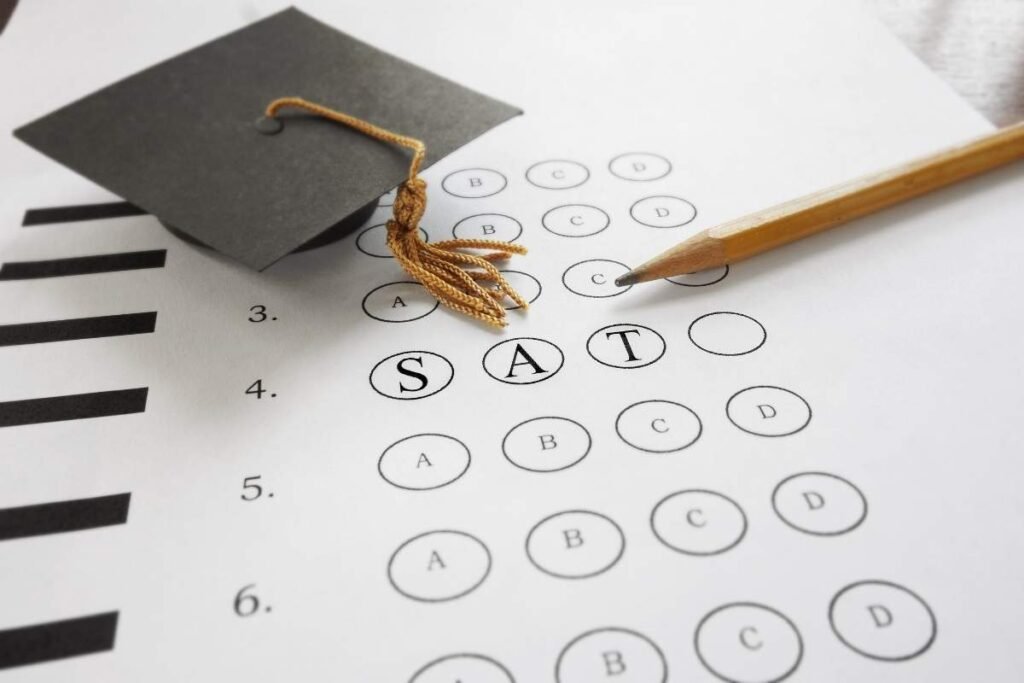College admissions are becoming increasingly competitive, which means that only the best performers are going to make it through.
According to the National Center for Education Statistics, the number of applications has been increasing steadily ever since 2014. In 2022, however, a notable acceleration occurred. The number of submitted applications increased by 21.3 percent for the period between 2019 and 2022.
In order to ace the application process, you have to be prepared and aware of what’s at stake. Planning your academic and extracurricular life is crucial to putting together a stellar application, including impressive school transcripts, letters of recommendation, and a thorough college application essay takes time. You will also need, financial aid offers, money for college, college planning advice, and more.
Each year of high school provides opportunities to learn more, sharpen your skills, do research, and undertake the steps required to ensure successful college admissions.

College Admissions Preparation for Freshman Students
Making the jump from eighth grade to ninth grade is a big deal—and not just because it means starting high school. It’s the very beginning of your journey toward college, career goals, and everything in between. Whether you’re dreaming of life on a college campus, exploring potential college majors, or just trying to figure out how to stay organized with all your new classes, this stage sets the foundation for your future. Freshman year is the perfect time to make a plan, start building academic goals, and develop important life skills like time management, problem-solving, and self-care.
Even though college might still feel far off, students should begin thinking about it now. Getting ready for college doesn’t mean choosing a school tomorrow—but it does mean familiarizing yourself with what’s ahead.
1. Take All the Right Courses
In junior high, you must make sure you are taking the best courses, so you can begin your first year of high school on the right foot. Focus mainly on academics and getting good grades by building good study habits. There’s still enough time to plan and get into the actual specifics of college applications.
It’s crucial to select all the classes you need for competitive college admission. This usually includes 4 years of English, 4 years of math, 4 years of science, 3-4 years of social studies, and 2 years of a foreign language. Although you will be ok with only 3 years of each subject for many colleges, it’s way better to be equipped with 4 years of each if you want to apply for admission into competitive colleges.
Grades become more relevant as soon as you start high school, so make sure you are studying hard and preparing yourself for the tests coming your way. Also, dedicate some time to reading about colleges and learning about their strengths. If you already have a particular college major that you’re interested in, you can narrow down the research even further.
Additional Reading: You’ll also want to read Before You Apply: The Must-Know Difference Between College and University.
Speak with a college coach today!
Speak with an expert college coach and learn if working with one is right for your academic journey. Free 15-minute consultation, no cost, no obligations.
2. Consider Higher Level Classes
Throughout all your years of high school, you will be given the option of taking honors, Advanced Placement classes (AP), and Dual Enrollment (DE/DC) courses. 9th grade usually only offers one or two of the more challenging courses, but the years to come will offer more advanced classes to choose from. Make sure you select the best academic offer available at your high school.
AP and DE/DC classes show the college admissions officers that you are ready for more rigorous classes. AP subjects also count for college credit if you pass the end-of-year final examination, while DE/DC classes could be transferred directly into your college transcript once the college you are applying to approves them as regular college courses.
3. Take On Extracurricular Activities
Your grades are not the only thing that matters when it comes to college. The admissions committee wants to see that you are involved in extra-curricular activities as well. Activities such as being on a sports team, being an active part of societies, or joining clubs are essential during your admission evaluation.
It also helps to have a portfolio of community activities that prove your dedication to helping others, as well as the ability to follow through and stick to your commitments. Participating in extracurricular activities can give you insight into what you care and are passionate about. This might even help you pick a major for college later on.
4. Make a Plan for Your First Preliminary SAT test (PSAT/NMSQT).
Although many high school teachers and counselors mistakenly consider this test “just an irrelevant practice test,” your Preliminary SAT matters and you should take it seriously as it will become your ticket, in eleventh grade, to be nominated National Merit Scholar. We NEVER recommend taking standardized tests without adequate preparation. Taking the tests just to “see what’s on them” is the worst strategy. To get ready for the standardized tests, DO NOT take an official test; there are plenty of free practices to get acquainted with to pinpoint your strengths and weaknesses. Take action as soon as possible and get ready for your PSAT/NMSQT as early as possible. Make sure you request your inclusion in the test since 9th grade. We are convinced that you won’t regret it.
Additional Reading: You can find more useful information in Test-Optional College Admissions: Does Skipping Standardized Testing Hurt Your Chances?

Preparing for College as a Sophmore Student
Tenth grade might seem early to think seriously about college, but it’s actually the perfect time to start exploring options, building good habits, and laying the foundation for your future. Whether you’re aiming for a four-year college degree, considering college online, or just starting to think about career aspirations, there are so many valuable steps you can take right now to stay on track.
You don’t need to have it all figured out yet—but you can start building a toolkit that will help you build confidence and direction academically. Start by getting organized and learning how to write strong essays and research papers. Be sure to check out resources like the Bureau of Labor Statistics to learn more about future job opportunities and industries in the U.S.
Additional Reading: Take A Look into the Highest-Paying College Majors.
5. Start Thinking About Colleges and Majors
10th grade is the time to start a family conversation regarding your interests. Begin your research for potential colleges you might want to attend. You can also check out the selection of majors they have to see what might interest you. Some people choose to go to college within their own state, while others want to move further away.
You can look into both options to find colleges that interest you. You may choose to look further into a college based on their programs or sports teams if you think this will help you with your decision. Many school students get scholarships based on a particular program like music or a team they play for in high school.
Additional Reading: You should also check out Trending Now: The Best College Majors for the Future.
6. Make the Most of Your Relationship with a MORZEP College Coach
A college coach, like the knowledgeable members of the Morzep team, can help you understand your options and the steps you’ll need to undertake in order to be accepted into the college of your dreams. You will get actionable recommendations and actual steps to follow during your junior and senior years.
7. Start Your College Resume
A good college resume includes information on extracurricular activities, volunteering work, internships, paid work you’ve done in the past, awards, academic accomplishments, and college prep programs. It’s a good idea to start working on the resume during your sophomore year, adding more information as time goes by.

8. Research Scholarships and Financial Aid Options
An important question that must be always at the forefront of your journey toward college. A college education is expensive. And so is college life. It’s always important to consider how you are going to get the money for college and if you need to apply for aid for college. Take this time to get familiar with the Free Application for Federal Student Aid (FAFSA) application and CSS Profile and all the financial terms they use. You can also start looking into college scholarships to see if there are any that you qualify for.
9. Continue Your Preparation for the PSAT/NMSQT
Continue studying for the SAT and ACT while also taking the Preliminary SAT (PSAT). This allows you to prepare for actual testing later. PSAT also allows you to qualify for the National Hispanic Recognition Program and National Merit Scholarship if you do well enough.
10. Continue Your Involvement in Clubs, Teams, and the Community
It might surprise you, but every club meeting, team practice, or community service project you participate in plays a role in preparing you for college—and admissions teams know it! Colleges are looking for well-rounded students who not only do well in their coursework but also engage in meaningful activities that show leadership, curiosity, and commitment. Whether it’s student government, theater, robotics, or volunteering at a local nonprofit, these experiences help build essential problem-solving skills, teach time-management, and give you a strong support network.
11. Meet Your High School Counselor
Together, you and your guidance counselor can discuss colleges, admissions, the college application process, and anything else of interest.
12. Get a Part-time Job, a Summer Job, or an Internship
The summer of your sophomore year is perfect to get some actual career-related experience to narrow down your eventual college choices.

What to Do to Prepare for College in Eleventh Grade
Eleventh grade is a turning point when it comes to college prep. With only one more year of college planning left before applications are due, it’s time to start getting serious. Whether you’re just beginning to explore what life on a college campus might look like, or you already have a dream degree program in mind, this is the year to dig in and start making real progress.
From learning about admissions requirements to researching schools that offer strong student services and solid graduation rates, you’re laying the groundwork for your future. For first-generation college students especially, this can feel like a big leap—but there are so many resources out there helping students just like you gain access to postsecondary education.
13. Form Relationships with Teachers
Almost every college application requires you to submit letters of recommendation. Your recommendation letters will have to come from teachers, counselors, or sports coaches. 11th grade is the best grade to start considering who you are going to ask for a letter of recommendation and send them your request. It’s always a good idea to ask teachers for recommendations in classes where you have excellent grades.
You might also want to make sure the teacher knows a little extra about you, such as if you are a member of certain clubs or if you work a part-time job. The best time to ask a teacher if they are willing to write you a letter of recommendation is in the spring of your junior year.
14. Research Colleges Further
11th graders should continue their college search and attend college fairs. Take a look at the college courses offered by your favorite colleges, check out their college entrance exams and requirements, and assess your college readiness. Make a list of the colleges that best suit your interests and academic achievements. Write down their programs and the scholarships available.
15. Take Your Last PSAT/NMSQT of Your Life
Continue your preparation for the PSAT/NMSQT that you will take for the last time in your high school career. TAKE your final PSAT/NMSQT and do your best effort to qualify for one of the National Recognition Programs: Merit, Hispanic, African American, Indigenous, or Rural or Small Town Areas.
16. Take the SAT/ACT
Despite the fact that currently, SAT/ACT tests are considered optional for many of the most competitive colleges in the U.S., we believe that getting a competitive score in standardized testing is still relevant for your admission process. Colleges will look at your scores on the SAT/ACT to determine your skills and readiness for college academics. Take as many practice tests as possible to get familiar with the tests and improve time management. You should take the tests twice if possible – once in the fall of junior year and once in the spring.
17. Talk to a College Admissions Coach
Use your junior year to discuss your options with a Morzep admissions coach. College admissions coaches can advise you on which schools might be best for you as well as give you tips to make yourself a more competitive candidate for admission. They can give you insights into the admissions process, discuss school courses that you should take considering your college options, recommend internship programs, and provide guidance on things like letters of recommendation, college essays, resumes, and practice exams.
18. Plan Your College Campus Tours for the Summer
Schedule visits online and arrive on campus on time. Be ready to be amazed by all the new facts you will learn about your potential college home in the following 4 years of your life.
Additional Reading: Learn about Creating an Effective College Visit Plan: Making the Most of Campus Tours.
19. Begin Admission Essays/Short Answers
The summer between 11th and 12th grade is the perfect time to begin your essays and short answers.
20. Join a Summer College Program
A summer program will help you understand the biggest differences between high school and college. This way, you’ll know what to expect in the future.

How to Prepare for College in Twelfth Grade
Senior year is here—and with it comes the final stretch of your high school to college journey! This is an exciting (and yes, sometimes overwhelming) time as you make big decisions about where you’re going, how to pay for college, and what kind of campus life feels like the right fit for you. Whether you’ve had a dream school in mind for years or are just starting to explore your options, twelfth grade is when everything starts to come together.
As you research schools, be sure to check their accreditation, academic offerings, and what kinds of support and student services they offer. Many colleges also provide great opportunities for students to explore interests outside the classroom, so take time to get a feel for different campuses, whether through tours or online visits. And remember—don’t try to do it all alone. Morzep College Coaches are here for you!
21. Retake SAT and ACT
If you’re not happy with the results from last year’s exams, use this final opportunity to perform better.
22. Send Off Your Applications
Most college applications are due in the early and late fall so you should make sure you never miss a deadline. You need to decide whether it is best to stick to the regular college admissions deadlines or go for early action or early decision process. Talk about your options with your college coach who can help you complete your college checklist in time to meet all deadlines. Plan your final campus tours, and repeat the SAT/ACT tests if you need to.
23. Complete the FAFSA and CSS Profile (if needed)
You can begin filling out your FAFSA and CSS Profile (if applicable) as early as October 1st of your senior year. It’s a good idea to have your parents help you in this step as they will need to include their federal income tax returns and bank/savings information.
24. Schedule Interviews
Some colleges that get back to you will want to schedule an interview before admissions are finalized. Use this opportunity to shine and provide some additional information on your interests and accomplishments.
College Preparation in the Summer Before College
By now, you have already chosen your final list of colleges and have begun your application process, but you can still spend the summer before you go applying for scholarships. Some students may choose to get a part-time job. The summer before college is also an important time to attend orientation and start your packing list. Exciting times are ahead! Enjoy your college experience!
Are You Ready for College? No Worries – Morzep College Coaching Is Here to Help!
Feeling overwhelmed by college applications, deadlines, and decisions? You’re not alone—and you don’t have to figure it out by yourself. At Morzep College Coaching, we specialize in helping students just like you navigate every step of the journey, from building a strong application to choosing the right college fit.
Whether you’re unsure where to start or just need a little extra support to stay on track, we’re here to guide you with personalized, stress-free coaching on the path toward successful college admissions. Let’s turn confusion into confidence—and get you excited about what comes next! Get in touch today!
Post Update: The article was updated on April 02nd, 2025, and originally published on April 29th, 2022. It has been completely revamped and updated for accuracy and comprehensiveness.





